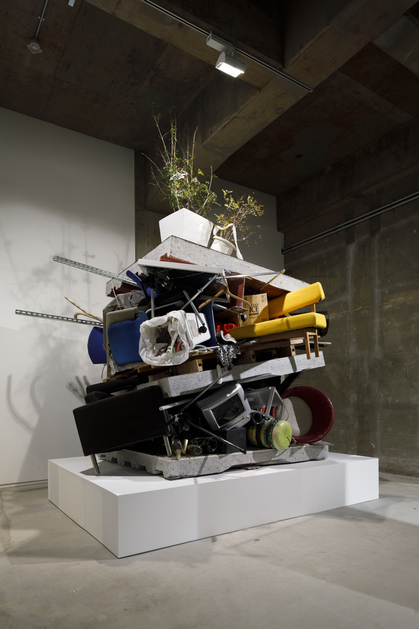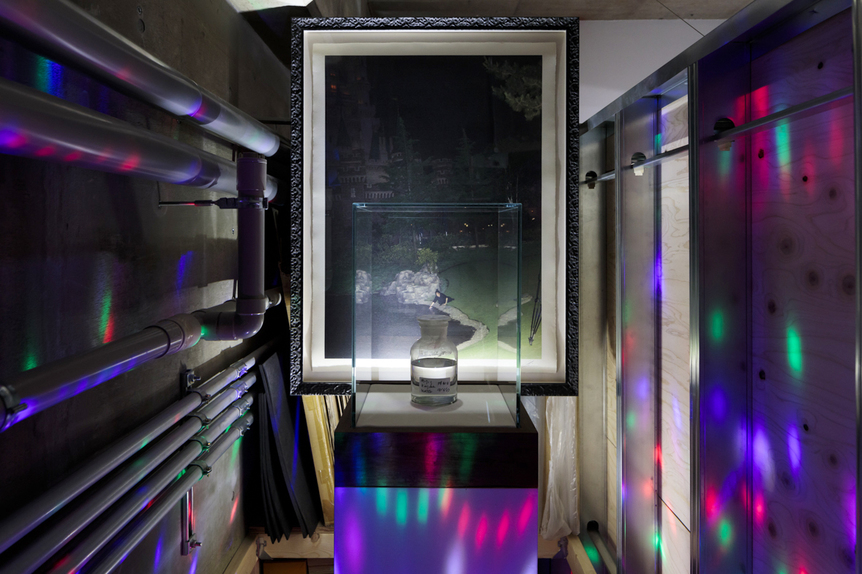-
From Current Issue
-
- Editor’s Letter Fire in the Heart
- Reviews I Gusti Ayu Kadek Murniasih
- Reviews 11th Seoul Mediacity Biennale: “One Escape at a Time”
- Dispatch Networked China
- One on One Monira Al Qadiri on Yukio Mishima
- Essays The rise of independent art spaces in pandemic-era Shanghai
- Features Tuan Andrew Nguyen
- Table of Contents
- Web Exclusives
- Archive
- Subscribe

R
E
V N
E
X
T
Installation view of CHIM↑POM’s “Grand Open – Marvelous Liberation –” at Anomaly, Tokyo, 2018–19. Photo by Kenji Morita. Copyright the artists. Courtesy Anomaly.
The six-piece artist group Chim↑Pom is no stranger to controversy. Formed by Ryuta Ushiro, Yasutaka Hayashi, Masataka Okada, Toshinori Mizuno, Motomu Inaoka and the mononymous Ellie, the collective makes art that is splashy, absurd, and somehow manages to blend sincerity with irreverence. The group’s latest exhibition, titled “Grand Open – Marvelous Liberation –,” was the inaugural show at Anomaly, the newest commercial gallery in Tokyo’s Terrada Art Complex.
Some of Chim↑Pom’s new works were lifted from their recent action in Kabukicho, Tokyo’s nominal red light district that is now more accurately a nightlife and entertainment oasis. With the municipal government in overdrive to clean up the neighborhood’s sleazy image ahead of the 2020 Olympics, old buildings in the area are being knocked down to make way for sterile office towers, shopping centers and high-end apartments. One of the structures slated for demolition was the Kabukicho Book Center, a bookstore run by the hosts of Smappa! Group, which operates several night clubs in the neighborhood. Chim↑Pom joined forces with Smappa! Group to open Ningen Restaurant (“Human Restaurant”) in the condemned building. For two weeks in October, ahead of the building’s destruction, diners at Ningen could eat versions of infamous criminals’ last meals—Gary Gilmore’s hamburger, baked potato, hard-boiled egg and three shots of whisky; “Black Widow” Judy Buenoano’s broccoli, asparagus and strawberries; serial killer John Wayne Gacy’s fried shrimp, fried chicken, fries and strawberries; Victor Feguer’s single olive with the pit; or Nazi senior officer Adolf Eichmann’s bottle of Carmel, an Israeli red wine. You could read this as commentary on how nearly one-third of the world’s countries still have the death penalty—a starting point in Okada’s research for the project—or a heavy-handed, lowbrow gesture for a final, hope-filled celebration before the site’s own death sentence. After the restaurant’s two-week run, Chim↑Pom ripped out parts of the floor to create two sculptures, both titled Build-Burger (2018), sandwiching junk from the pop-up eatery between chunks of its flooring. A video shot during the restaurant’s operation played at Anomaly, and copies of the menu were left out for visitors to flip through.
The collective has a history of riffing off modern consumerism, and the exhibition gave the impression that all of the art at Anomaly was made to be sold like merchandise, with some “new” works being updated versions of older creations. Magic Kingdom Water (2018) consists of water drawn from a fountain in Tokyo Disneyland and a blown-up photo documenting the moment when it was collected; these were tucked into a loft nook constructed by the artists at Anomaly, lit like a cheap discotheque and accessible only by braving a wobbly, patchwork staircase assembled from metal pipes and wood planks. The installation was a rehash of an action performed in 2014, when the group sold vials of the stuff for 3,000 yen a pop. Nice Park (2018), a Nike swoosh painted chartreuse and turned into a working spring rider, was a sleeker duplicate of one of the group’s older sculptures.
There was art made by robots too. These works were part of the 2018 project Downtown Paradox, where the artists outfitted robot vacuum cleaners with cans of paint and paint rollers to drag out what look like abstract paintings. Partly a critique of the automation of labor, and partly an investigation of (human) emotional and creative expression, these paintings also raise questions about the value of art made by nonliving entities—fitting after Christie’s sold an AI-created portrait of a man in the fictitious Belamy family for USD 432,500 in October.
After you exit the exhibition at Anomaly, a banged-up mannequin head in a ball net stares at you as you wait for the elevator. It’s not quite clear whether this is part of Chim↑Pom’s show, but the head looks a little like Ellie’s. Somewhere, a doll made solely as an instrument for selling clothes was decapitated, a droll gesture bringing back to mind a dead restaurant, arbitrarily priced bottled water and mechanically, algorithmically generated smears of art.
Brady Ng is the Guangzhou desk editor of ArtAsiaPacific.
Chim↑Pom’s “Grand Open – Marvelous Liberation –” is on view at Anomaly, Tokyo, until January 26, 2019.
To read more of ArtAsiaPacific’s articles, visit the Digital Library.















